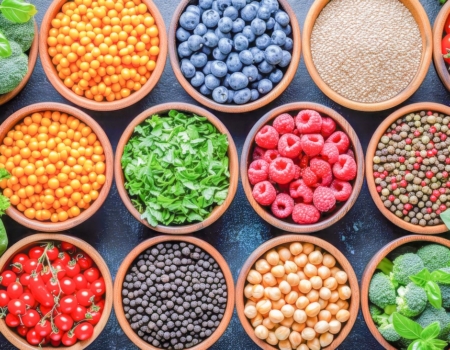Foods That Promote Mental Well-being

Let food be thy medicine applies not only to our physical but also mental health. While there is no one size fits all diet, eating patterns rich in fruits, vegetables, nuts, seeds, legumes and whole grains like that of a Mediterranean diet have consistently been linked to better mental health. Certain foods in particular have been shown to have a profound effect on our ability to regulate our emotions and subsequently some of our behaviors.
Here are some nutrient-dense foods we can include in our diet to boost our mood and keep us feeling vibrant, motivated, and ready to take on the day!
Dark Leafy Greens
Dark leafy greens like kale, collard greens, and spinach just to name a few are among the healthiest foods on the planet. They are jam-packed with nutrients including vitamin C, calcium, magnesium, and folate which influence the chemicals in our brain that regulate mood and mental process. It’s been shown that even just 1 serving of dark leafy greens a day can significantly slow cognitive decline as we age. (1,2)
Flax Seed
Flaxseed is a nutritional powerhouse. Only 2 tablespoons of flaxseed a day can give us a healthy dose of fiber and omega-3 fatty acids. The fiber helps naturally manage blood sugar levels and promotes more stable moods. The omega-3s used to build brain and nerve cells foster learning, memory, and elevated mood. (3, 4, 10)
Tart Cherries
Lack of sleep can cause stress, anxiety, and irritability. Tart cherries effectively help improve sleep by increasing the production of melatonin and the “feel-good hormone” serotonin in the body. They also have strong anti-inflammatory properties that can prevent and reduce gout pain and potentially alleviate emotional stress. (5, 6, 11)
Fermented foods
The gut has been called the “second brain” because much like the brain, it produces mood-regulating hormones. About 95% of our serotonin and 50% of our dopamine is produced in the gastrointestinal tract of our gut bacteria. Fermented food like Kimchi and sauerkraut, are loaded with prebiotics and probiotics, promote good gut health and encourages the production of these mood-enhancing hormones. (7, 8, 9)
Beans
Nutrient deficiencies can affect how the body makes hormones and responds to stress. Beans are a great addition to any plate because they truly have it all. They are a great source of fiber, protein, iron, folate, magnesium, and phosphorus. They also contain tryptophan, a procurer for serotonin which can produce a calming and anti-depressant effect. (1, 12)
Berries
Berries, especially strawberry, bilberry, blackcurrant, blackberry, blueberry, and mulberry are a type of superfoods that are well known for their antioxidant properties. However, anthocyanidins the pigment that gives berries their red, purple, and blue colors are quite impressive. They have been shown to enhance cognitive functions like learning and memory as well as postpone age-related mental decline. (13, 14)
Mushrooms
Mushrooms are rich in amino acids such as ergothioneine, glutamine, and GABA which help protect the brain and enhance mental performance. Research shows they have the potential to reduce risks of dementia, relieve stress and anxiety, fatigue, and help with the recovery of nerve and brain damage. (1)
*Honorable mentions include herbs like turmeric and saffron.
References
- Briguglio, M., Dell’Osso, B., Panzica, G., Malgaroli, A., Banfi, G., Zanaboni Dina, C., Galentino, R., & Porta, M. (2018). Dietary Neurotransmitters: A Narrative Review on Current Knowledge. Nutrients, 10(5), 591. https://doi.org/10.3390/nu10050591
- Morris, M. C., Wang, Y., Barnes, L. L., Bennett, D. A., Dawson-Hughes, B., & Booth, S. L. (2018). Nutrients and bioactives in green leafy vegetables and cognitive decline: Prospective study. Neurology, 90(3), e214–e222. https://doi.org/10.1212/WNL.0000000000004815
- Mayo Clinic. (2020, Nov. 14). Flaxseed and flaxseed oil. https://www.mayoclinic.org/drugs-supplements-flaxseed-and-flaxseed-oil/art-20366457
- Parikh, M., Maddaford, T. G., Austria, J. A., Aliani, M., Netticadan, T., & Pierce, G. N. (2019). Dietary Flaxseed as a Strategy for Improving Human Health. Nutrients, 11(5), 1171. https://doi.org/10.3390/nu11051171
- Howatson, G., Bell, P. G., Tallent, J., Middleton, B., McHugh, M. P., & Ellis, J. (2012). Effect of tart cherry juice (Prunus cerasus) on melatonin levels and enhanced sleep quality. European journal of nutrition, 51(8), 909–916. https://doi.org/10.1007/s00394-011-0263-7
- Losso, J. N., Finley, J. W., Karki, N., Liu, A. G., Prudente, A., Tipton, R., Yu, Y., & Greenway, F. L. (2018). Pilot Study of the Tart Cherry Juice for the Treatment of Insomnia and Investigation of Mechanisms. American journal of therapeutics, 25(2), e194–e201. https://doi.org/10.1097/MJT.0000000000000584
- Carpenter, S. (2012, September). That gut feeling. Monitor on Psychology, 43(8). https://www.apa.org/monitor/2012/09/gut-feeling
- Eisenhofer G, Aneman A, Friberg P, Hooper D, Fandriks L, Lonroth H, et al. Substantial production of dopamine in the human gastrointestinal tract. J Clin Endocr Metab.(1997) 82:3864–71. doi: 10.1210/jc.82.11.3864
- Weaver, J. Stanford Medicine. (2021, July. 11). https://med.stanford.edu/news/all-news/2021/07/fermented-food-diet-increases-microbiome-diversity-lowers-inflammation
- (10)Wergine, A. Mayo Clinic Health System. (2015, March 31). https://www.mayoclinichealthsystem.org/hometown-health/speaking-of-health/flaxseed-is-nutritionally-powerful
- (11)Collins, M. W., Saag, K. G., & Singh, J. A. (2019). Is there a role for cherries in the management of gout?. Therapeutic advances in musculoskeletal disease, 11, 1759720X19847018. https://doi.org/10.1177/1759720X19847018
- (12) Mullins, A. P., & Arjmandi, B. H. (2021). Health Benefits of Plant-Based Nutrition: Focus on Beans in Cardiometabolic Diseases. Nutrients, 13(2), 519. https://doi.org/10.3390/nu13020519
- (13) Kalt, W., Cassidy, A., Howard, L. R., Krikorian, R., Stull, A. J., Tremblay, F., & Zamora-Ros, R. (2020). Recent Research on the Health Benefits of Blueberries and Their Anthocyanins. Advances in nutrition (Bethesda, Md.), 11(2), 224–236. https://doi.org/10.1093/advances/nmz065
- (14) Subash, S., Essa, M. M., Al-Adawi, S., Memon, M. A., Manivasagam, T., & Akbar, M. (2014). Neuroprotective effects of berry fruits on neurodegenerative diseases. Neural regeneration research, 9(16), 1557–1566. https://doi.org/10.4103/1673-5374.139483




